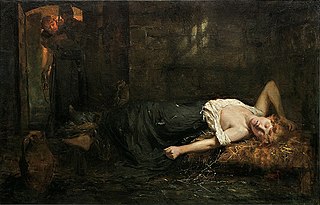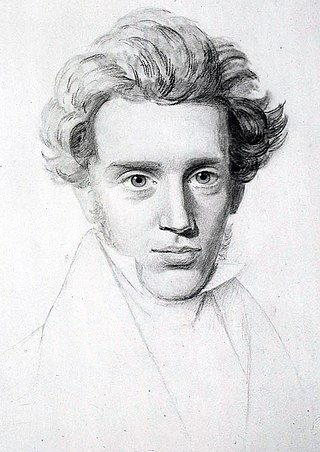
Existentialism is a form of philosophical inquiry that explores the issue of human existence. Existentialist philosophers explore questions related to the meaning, purpose, and value of human existence. Common concepts in existentialist thought include existential crisis, dread, and anxiety in the face of an absurd world, as well as authenticity, courage, and virtue.

Nihilism is a philosophy, or family of views within philosophy, that rejects generally accepted or fundamental aspects of human existence, such as objective truth, knowledge, morality, values, or meaning. The term was popularized by Ivan Turgenev, and more specifically by his character Bazarov in the novel Fathers and Sons.

Søren Aabye Kierkegaard was a Danish theologian, philosopher, poet, social critic, and religious author who is widely considered to be the first existentialist philosopher. He wrote critical texts on organized religion, Christianity, morality, ethics, psychology, and the philosophy of religion, displaying a fondness for metaphor, irony, and parables. Much of his philosophical work deals with the issues of how one lives as a "single individual", giving priority to concrete human reality over abstract thinking and highlighting the importance of personal choice and commitment. He was against literary critics who defined idealist intellectuals and philosophers of his time, and thought that Swedenborg, Hegel, Fichte, Schelling, Schlegel, and Hans Christian Andersen were all "understood" far too quickly by "scholars".

Martin Heidegger was a German philosopher who is best known for contributions to phenomenology, hermeneutics, and existentialism. He is among the most important and influential philosophers of the 20th century. He has been widely criticized for supporting the Nazi Party after his election as rector at the University of Freiburg in 1933, and there has been controversy about the relationship between his philosophy and Nazism.
John David Caputo is an American philosopher who is the Thomas J. Watson Professor of Religion Emeritus at Syracuse University and the David R. Cook Professor of Philosophy Emeritus at Villanova University. Caputo is a major figure associated with postmodern Christianity and continental philosophy of religion, as well as the founder of the theological movement known as weak theology. Much of Caputo's work focuses on hermeneutics, phenomenology, deconstruction and theology.

Knud Ejler Løgstrup was a Danish philosopher and theologian. His work, which combines elements of phenomenology, ethics and theology, has exerted considerable influence in postwar Nordic thought. More recently, his work has been discussed by prominent figures in anglophone philosophy and sociology such as Alasdair MacIntyre, Robert Stern, Simon Critchley and Zygmunt Bauman.
Karl Löwith was a German philosopher in the phenomenological tradition. A student of Husserl and Heidegger, he was one of the most prolific German philosophers of the twentieth century.
"God is dead" is a statement made by the German philosopher Friedrich Nietzsche. The first instance of this statement in Nietzsche's writings is in his 1882 The Gay Science, where it appears three times. The phrase also appears in Nietzsche's Thus Spoke Zarathustra.
Christian existentialism is a theo-philosophical movement which takes an existentialist approach to Christian theology. The school of thought is often traced back to the work of the Danish philosopher and theologian Søren Kierkegaard (1813–1855) who is widely regarded as the father of existentialism.

Walter Arnold Kaufmann was a German-American philosopher, translator, and poet. A prolific author, he wrote extensively on a broad range of subjects, such as authenticity and death, moral philosophy and existentialism, theism and atheism, Christianity and Judaism, as well as philosophy and literature. He served more than 30 years as a professor at Princeton University.

Jean-Luc Marion is a French philosopher and Roman Catholic theologian. Marion is a former student of Jacques Derrida whose work is informed by patristic and mystical theology, phenomenology, and modern philosophy. Much of his academic work has dealt with Descartes and phenomenologists like Martin Heidegger and Edmund Husserl, but also religion. God Without Being, for example, is concerned predominantly with an analysis of idolatry, a theme strongly linked in Marion's work with love and the gift, which is a concept also explored at length by Derrida.

Philosophical anthropology, sometimes called anthropological philosophy, is a discipline dealing with questions of metaphysics and phenomenology of the human person.
Ontotheology means the ontology of God and/or the theology of being. While the term was first used by Immanuel Kant, it has only come into broader philosophical parlance with the significance it took for Martin Heidegger's later thought. While, for Heidegger, the term is used to critique the whole tradition of 'Western metaphysics', much recent scholarship has sought to question whether 'ontotheology' developed at a certain point in the metaphysical tradition, with many seeking to equate the development of 'ontotheological' thinking with the development of modernity, and Duns Scotus often being cited as the first 'ontotheologian'.

John Macquarrie (1919–2007) was a Scottish-born theologian, philosopher and Anglican priest. He was the author of Principles of Christian Theology (1966) and Jesus Christ in Modern Thought (1991). Timothy Bradshaw, writing in the Handbook of Anglican Theologians, described Macquarrie as "unquestionably Anglicanism's most distinguished systematic theologian in the second half of the 20th century."
Atheistic existentialism is a kind of existentialism which strongly diverged from the Christian existential works of Søren Kierkegaard and developed within the context of an atheistic world view. The philosophies of Søren Kierkegaard and Friedrich Nietzsche provided existentialism's theoretical foundation in the 19th century, although their differing views on religion proved essential to the development of alternate types of existentialism. Atheistic existentialism was formally recognized after the 1943 publication of Being and Nothingness by Jean-Paul Sartre and Sartre later explicitly alluded to it in Existentialism is a Humanism in 1946.

Mark Wrathall is Professor of Philosophy at the University of Oxford and a fellow and tutor at Corpus Christi College, Oxford. He is considered a leading interpreter of the philosophy of Martin Heidegger. Wrathall is featured in Tao Ruspoli's film Being in the World. According to a recent reviewer of Wrathall's latest book, "Wrathall's writing is clear and comprehensive, ranging across virtually all of Heidegger's collected works.... Wrathall's overall interpretation of Heidegger's work is crystal clear, compelling, and relevant."

Fred Reinhard Dallmayr is an American philosopher and political theorist. He is Packey J. Dee Professor Emeritus in Political Science with a joint appointment in philosophy at the University of Notre Dame (US). He holds a Doctor of Law from the Ludwig Maximilian University of Munich, and a PhD in political science from Duke University. He is the author of some 40 books and the editor of 20 other books. He has served as president of the Society for Asian and Comparative Philosophy (SACP); an advisory member of the scientific committee of RESET – Dialogue on Civilizations (Rome); the executive co-chair of World Public Forum – Dialogue of Civilizations (Vienna), and a member of the supervisory board of the Dialogue of Civilizations Research Institute (Berlin).
The following is a bibliography of John D. Caputo's works. Caputo is an American philosopher closely associated with postmodern Christianity.
Sean Joseph McGrath is a Canadian philosopher and Professor of Philosophy at Memorial University of Newfoundland. He is known for his published work in the history of philosophy and the philosophy of religion. Major single-authored works include The Dark Ground of Spirit: Schelling and the Unconscious (2012), Thinking Nature: An Essay in Negative Ecology (2019), and The Philosophical Foundations of the Late Schelling: The Turn to the Positive (2021). McGrath was awarded the President's Award for Outstanding Research at Memorial University in 2012. He was inducted into the Royal Society of Canada as Member of the College of New Scholars in 2014. In 2022, in collaboration with the Centre of the Cross, McGrath released a series of podcasts on secular Christianity called Secular Christ.










